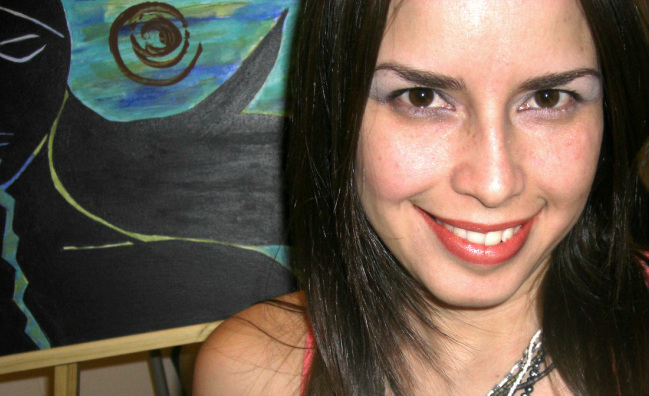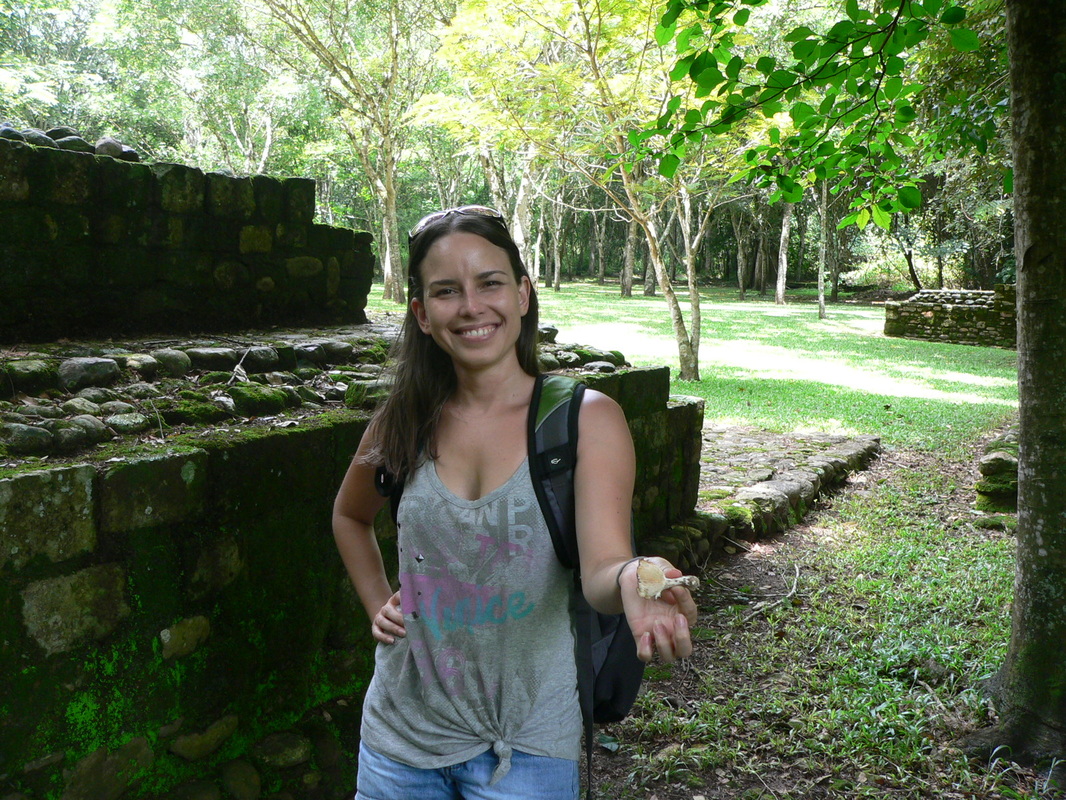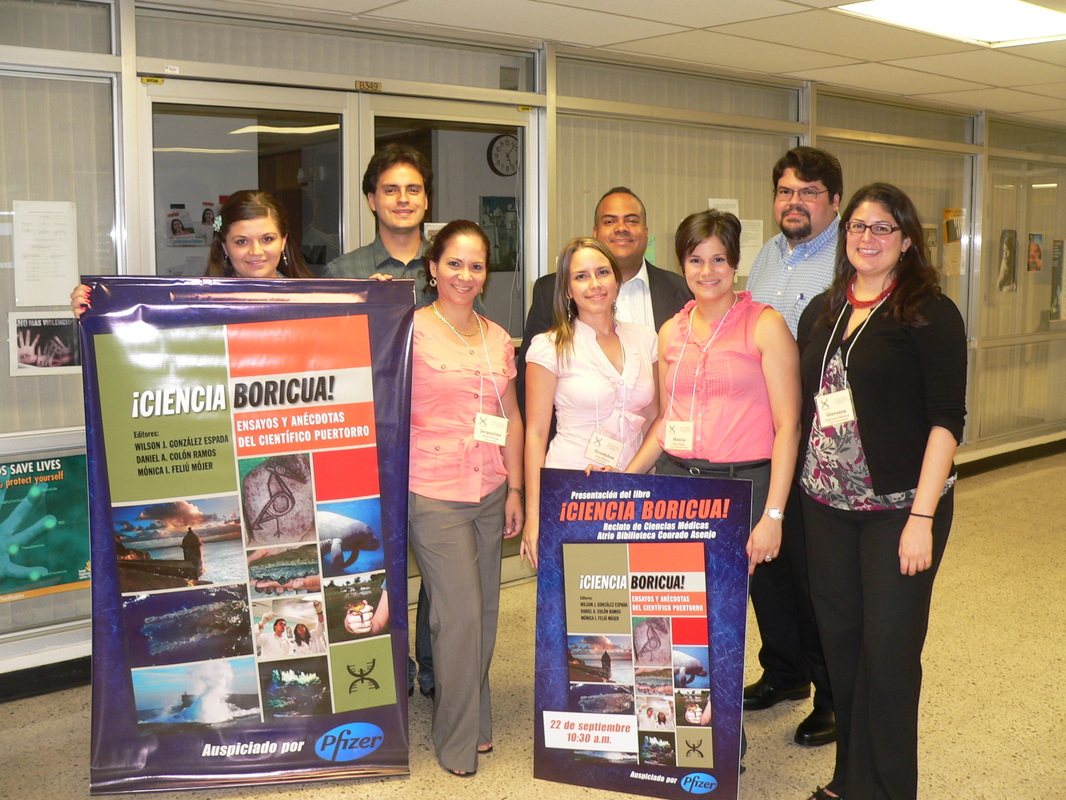|
8/21/2013 0 Comments Scientista Spotlight: Greetchen Diaz, PhD., NIH Postdoctoral Fellow at the Nebraska Center for Virology (University of Nebraska, Lincoln)
By Jessica Khaimova
Dr. Greetchen Díaz has, perhaps, one of the most inspirational stories of discovering and finding passions. She went from wanting to be an astronomer to becoming one of the first biologists in Puerto Rico to study fungal populations in a high-salinity environment. Dr. Diaz currently studies HPV (human papillomavirus) as an NIH Postdoctoral Fellow. Her story epitomizes the perks of open-mindedness. Read on to find out how her unique experiences have shaped her to become a successful Scientista who is, in addition, giving back by aiding young Latina women in pursuing advanced careers in science. Q: How did you get interested in science? What, or who, inspired you? Please tell us about your journey and how it all got started. A: For me, it happened when I was still in Puerto Rico, in elementary school. There, I had two female teachers–one taught science and the other taught math. They inspired and guided me. In addition, my math teacher in middle school (also female) was very supportive. During those years, I thought of becoming an astronomer. I was serious about things like space and life-forms on other planets. My source of inspiration back then was an encyclopedia. I used to read it and started to learn many things about science, history and other countries. For me, it was the best book as it contained everything. Also, by that time, I was trying to figure out what I wanted to do in the future. I learned from my middle school teachers that there was a specialized high school in science and math about two hours away from my town. I had to apply, and they only accepted the best students. It was a residential school, so I had to make new friends and be far from my family. It was life changing because that opportunity opened many doors for me. When I went to [that] school, I learned so many things. Perhaps, the most important thing I learned was that I’m not good [at] physics, so maybe being an astronomer was not a good idea. In addition, I became more interested in biology in high school. I took more courses related to that. Q: Tell us about your education and contributions to science while you were in college and graduate school. What did you study as an undergraduate student? What university did you attend? Did you enter a master's program, or did you go straight to a PhD program? Where did you earn your PhD, and what was your dissertation about? A: After high school, I was accepted to the University of Puerto Rico, Mayagüez Campus. I ended up doing my bachelor’s in biology. I was still a little confused about what I liked in biology. I was still feeling that I was not in the right place at all. It took me until my third year, when I met another mentor who is a mycologist. He inspired me a lot by introducing me to the world of fungi. So I decided to stay in P.R. to do my master’s degree in biology. I had a great advisor, and I studied fungal populations in extreme environments. I did the first studies in Puerto Rico related to fungal populations in a high-salinity environment. As my master’s research was mainly in general microbiology and fungal taxonomy, I decided to do my PhD in a school where people researched molecular biology and fungi. I applied to The Ohio State University, which was my first option. I ended up enrolling in the molecular, cellular and developmental biology interdisciplinary program. My PhD advisor at Ohio State was an outstanding mentor. In her lab, I studied protein targeting to the nuclear membrane, a process that is extremely important in our cells. Using yeast as a genetic model, I described the role of essential genes that, when mutated, affected nuclear membrane targeting of a specific group of proteins named peripheral proteins.
Q: What field are you in? What is your research about?
A: After earning my PhD, I entered a postdoctoral program at the Nebraska Center for Virology, which is part of the University of Nebraska. I study HPV (human papillomavirus) replication and maintenance. As we are able to replicate the virus in yeast, I [use] yeast genetic tools in order to study genes that are important for HPV replication and maintenance. We are interested in these processes as they are key in understanding [the] persistence capacity of this virus in our cells. Q: What is the most challenging aspect about your field/research? What is the most important thing you have learned from those challenges? A: I think that the most challenging part, in general for a scientist, is that you don’t know what to expect. When you do research, you start with an aim, an idea, and a hypothesis, but, perhaps, you end with something very different. That makes research and science special [among] many other professions. In graduate school, that is very challenging because it is not easy to know that you are starting [a] kind of “adventure” and that your degree depends on that. The most important thing is that you have to be patient. I have learned a lot of patience in my career. I am more patient now than ever before. Q: What do you love most about your field/research? A: I love that it’s dynamic and not predictable. It really excites me. It also inspires me because I can discover things that are new and can be potentially good for life and society. Q: Tell us about your experience as a woman in science. A: One thing that happens to me is that I am surrounded mainly by men in meetings. My research is the most important aspect at meetings, but I like fashion and to look appropriate. I don’t think a scientist needs to have a bad fashion sense. In general, for women, (even more for women scientists) the stereotype is that the more you take care of your image, the less smart you are. I think that is absolutely wrong, and it should change. I definitely want people to learn from my intellect and my contributions in science, but at the same time, to accept me as a woman and as a Latina (which I’m very proud of).
Q: Please tell us more about your experience as part of the administrative team of Ciencia Puerto Rico. Also, how do you advocate for Latina women in science?
A: In 2008, I learned about Ciencia de Puerto Rico (www.cienciapr.org, CienciaPR) a non-profit organization that promotes science and research among Puerto Ricans and Latinos and was interested in helping. I like doing volunteer work and helping. For me, CienciaPR was the right fit to help and to inspire others. I became a volunteer and started to do small things. With time, I got more important responsibilities. Now I work in different aspects, but my main job is to coordinate the volunteer work and to manage the social networks. Also, being a member of CienciaPR opened my mind to a lot of other science career options other than academia….So I can say that this experience changed my life. Recently, I was thinking about doing something related to Latina women in science. In P.R. we have many female scientists. However, we have women who are not reaching the highest positions. I thought it would be a great idea to form a community within CienciaPR of women scientists. As a result, I decided to create a new section in our CienciaPR Blog that will be launched in about a month that is related to Puerto Rican women who do work in science and technology. I gathered young Puerto Rican colleagues, members of CienciaPR who will help me develop the blog, and together, we will share the stories of inspirational role models and talk about opportunities for Latin women and minorities. We plan to collaborate with people through the blog so that it will lead to more innovation in the future and will bring better and [more] diverse information to our audience. Q: What advice would you give to students who hope to pursue a career in science? A: I think my best advice is that you need to find mentors to have a successful career. I [have] found specific mentors (great ones) in my career at the right moments. If they don’t come to you, you have to find them. Mentorship is important especially for women, and there is nothing wrong with seeking help from someone else. Q: What was it like to move from Puerto Rico to the USA? A: I was a bit afraid to come here. Once I arrived here, it was hard because I came from a tropical island in the Caribbean and went to Ohio. The winter weather was cruel to me, but I adapted. The language was obviously different. I was wrong to think that I was unable to communicate in English. That was an eye-opener for me. Also I had to learn a lot about American culture within the first year. It changed me in so many ways, but I am glad I made the decision to study for my PhD in the United States. I learned from [so] many new experiences, and, now, I am ready to share what I have learned with others. About the Blogger
Jessica Khaimova, a native New Yorker, is an undergraduate student at the City University of New York, Brooklyn College and is part of her university’s honors academy (class of 2016). Jessica is currently majoring in earth and environmental science as well as minoring in mathematics/physics. In addition to conducting research on paleoclimates and the atmosphere, she serves as a member of her university’s Geology Society and writes for the student newspaper. Starting this fall, she will also aid incoming students as a peer mentor. She is an avid fan of writing, astronomy, science fiction shows (such as Doctor Who, Firefly, and Eureka), and tea. Visionaries such as Carl Sagan (a personal hometown hero for Jessica), Michio Kaku, J.K. Rowling, Neil deGrasse Tyson, Bill Nye, and J.R.R. Tolkien have always inspired her.
Comments? Leave them below!
0 Comments
Leave a Reply. |
SPOTLIGHTSMeet our Scientista Spotlights -- current-day women in STEM and women from science history -- and find your role model! Read opinion editorials and history pieces to get additional inspiration.
WHAT'S NEWYOU MIGHT ALSO LIKE
WHAT'S HOTCONNECT WITH USARCHIVES
June 2018
|
The Scientista Foundation, Inc. All Rights Reserved © 2011-2021 | Based in NY | contact@scientistafoundation.org
The Network for Pre-Professional Women in Science and Engineering
The Scientista Foundation is a registered 501(c)(3) -- Donate!
The Network for Pre-Professional Women in Science and Engineering
The Scientista Foundation is a registered 501(c)(3) -- Donate!












 RSS Feed
RSS Feed